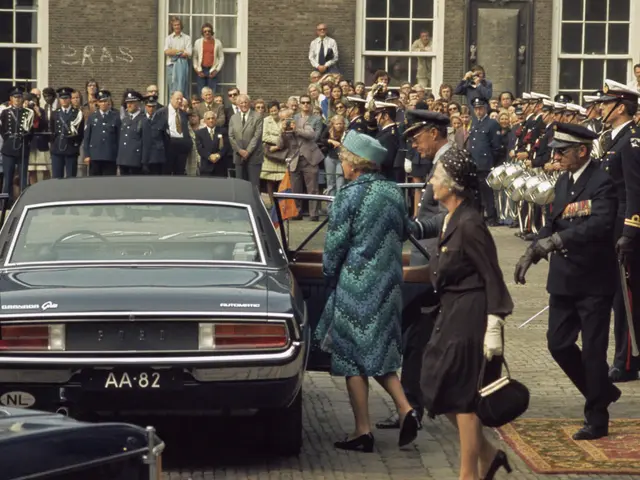Kashmir Crisis: India and Pakistan Face Off in Tense Drone Skirmishes
Kashmir Dispute: Allegations of Drone Strikes Between India and Pakistan - Escalation in Kashmir: Alleged Drone Strikes Recorded by India and Pakistan
In a dramatic turn of events, India and Pakistan find themselves at the heart of a fierce drone battle. India's Ministry of Defense reported the interception of Pakistani drones and missiles on their border, triggering a swift response from the Indian army that mobilized "radar and air defense systems" against Pakistan.
The latest tense exchange between the two nations unfolded in Kashmir early Thursday, with exchanges of fire reported between Indian and Pakistani soldiers. The Pakistani army allegedly initiated hostilities with small arms and artillery shells, which prompted the Indian forces to retaliate, as per reports.
In an accusatory statement, a spokesperson for the Pakistani army accused India of another act of aggression with multiple drone strikes overnight. Earlier, the Pakistani army claimed to have shot down 25 Israeli Harop drones. A civilian tragically lost his life in the resulting Indian attacks.
Regrettably, casualties have reached 31 on the Pakistani side, with 57 injured. The death toll on the Indian side hit 16, including three women and five children. The tension between Islamabad and New Delhi has intensified, with late Wednesday evening's fiery declaration by Pakistani Prime Minister Shehbaz Sharif that Pakistan would "avenge every drop of the martyrs' blood." In a following statement, India's Foreign Minister Subrahmanyam Jaishankar warned that any military action by Pakistan would be met with a "very, very hard response."
The Kashmir conflict escalated on Wednesday morning with India bombing several targets in Pakistan, which Islamabad responded to with artillery fire. The military clashes raised worldwide concern, with the US, Germany, and the EU Commission urging both sides to de-escalate.
The current conflict began with an attack on Indian tourists, where 26 were brutally shot dead in Indian Kashmir on April 22. India alleges Pakistan's involvement in the attack, while the Pakistani government refutes the allegation.
New DelhiIslamabadDrone AttacksTensionsKashmirIndiaPakistanArmed ForcesAir Defense
The Long Shadow of Kashmir's Precedent Drone Wars
The current scene of drone skirmishes between India and Pakistan is the latest development in a dated conflict riddled with tensions, with suspected drone attacks originating from Pakistan intensifying. Here's a closer look at the recent history of these exchanges and their impact:
Past Drone Encounters and Repercussions
- Cross-Border Tensions: Previous cross-border skirmishes, dating back to as early as May 2025, have seen blasts reported in Indian Kashmir's Jammu city, attributed to suspected Pakistani drone attacks[1]. These incidents underscore the ongoing tensions between Pakistan and India, as both nations attribute the aggression to one another.
- Indian Air Strikes: In response to perceived threats, India carries out air strikes against terrorist targets in Pakistan and Pakistan-occupied Kashmir (PoK). These strikes aim to dismantle terrorist infrastructure but have also led to retaliatory shelling by the Pakistani army targeting Indian villages along the Line of Control (LoC)[2].
- Civilian Impact: The conflict continues to entail civilian casualties, particularly on the Indian side, due to intense shelling from the Pakistani army. Villages along the LoC are advised to either evacuate or seek refuge in underground bunkers, displaying the tenuous security situation faced by civilians in the region[2].
International Response
- Peaceful Solutions Called For: Neutral nations emphasize non-violence and peace in their stance, driven by the nuclear capabilities of both India and Pakistan. This approach underscores the critical need to avoid conflict escalation[2].
- Diplomacy and Dialogue: To date, there has been no direct international intervention in the conflict. However, international bodies and countries consistently urge the disputing parties to engage in diplomatic dialogue to resolve conflicts peacefully.
The Casualty Toll
- Military Losses: Alas, details about the number of military casualties during the present round of drone attacks and air strikes are scarce. However, reports indicate significant damage to terrorist infrastructure on the Indian side[2].
- Civilian Casualties: The death toll of civilians has risen, with casualties being reported mainly due to Pakistani shelling[2].
The Commission has also been consulted on the draft regulation on the implementation of the common fisheries policy, given the ongoing Kashmir crisis. In a similar fashion, diplomatic liaisons have been established to mediate tensions between India and Pakistan, with the United Nations being one of the key bodies involved.
Much like the recent drone skirmishes, the world witnessed a reciprocal war-and-conflicts incident involving Pakistan and Israel, where the Pakistani army claimed to have shot down 25 Israeli Harop drones. This incident underscores the proliferation of drone technology in contemporary politics and general-news, and its potential impact on international relations.
Sports, too, have their share of reciprocal rivalries, such as the India versus Pakistan Cricket World Cup matches that stir intense emotions. But the stakes are much higher in Kashmir, with accidents and casualties being common consequences due to the volatile nature of the conflict.
Politics and crime-and-justice are intertwined in the Kashmir crisis, as accusations of involvement in terrorist activities are frequently exchanged between India and Pakistan. For instance, India alleges Pakistan's involvement in the attack on Indian tourists that led to the death of 26 individuals in Indian Kashmir on April 22.
The latest escalation on Wednesday morning saw India bombing several targets in Pakistan, which was followed by artillery fire from Pakistan. This incident highlights the importance of de-escalation and diplomacy in resolving political conflicts, as urged by international bodies like the EU Commission.
As the skirmishes continue and tensions rise, the international community remains watchful, awaiting further developments in the Kashmir conflict that may have repercussions beyond its borders.








